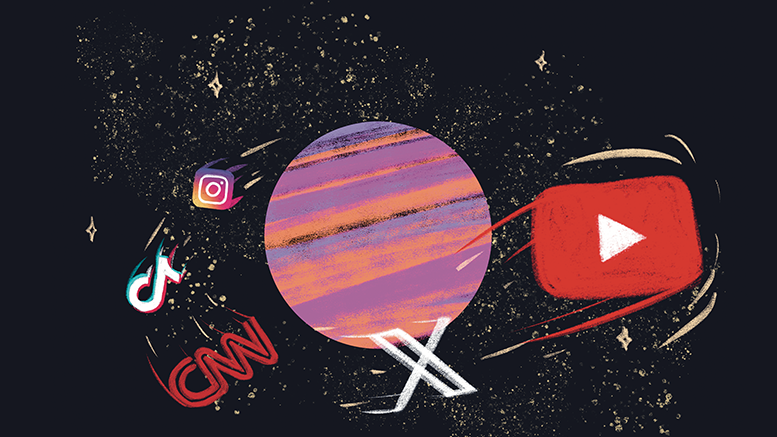Media consumption has come to dominate our perception of reality and truth. In a world that prioritizes profit over information, our own media consumption habits have defined our political understandings and daily lives.
Today, we consume information at a spectacular rate, more than ever before in world history. According to one study conducted by Meltwater, 500 million years of collective human time is spent on social media each year.
This staggering statistic reveals our dependence on this form of consumption within the contemporary age. Social media, and generally digital media, is how the majority of people now interact with the world. News, art and literature are all available with the push of a button.
The internet and social media, in all its vastness, should offer an experience akin to an exploration of an ever-expanding universe of the human condition. Even with limitless opportunities for information, we are collectively less informed. Instead, we live in wildly different worlds that drive us into tailored media landscapes. The distance and isolation between these landscapes may as well be different planets.
For many, if not all, this is obvious. We have all had bizarre and often frustrating interactions with some of our closest peers and even family members. Conversations can quickly lead to tense arguments as we suffer a major disconnection between our conflicting worldviews.
This phenomenon is often described as an echo chamber. Though this term describes a similar phenomenon, I believe it does not articulate the full scope of the problem. Our information planets are, in fact, a massive network of echo chambers each more pervasive and isolating than the last. Even those who appear to be the most in their own world will always be one more entrenched and isolated.
These different worlds that we live in, unfortunately, do not end at the smartphone but instead seep inside our politics.
Social media has served to justify the bizarre and most extreme positions in our politics. Many may shudder to be reminded of the American presidential debate only a few weeks ago, when a presidential candidate repeated a social media lie that immigrants were eating pets. This is an obviously outrageous claim but one echoed by people with immense power.
This sort of media politics is also very present here in Canada. Over the past months, we have seen a dramatic uptick of anti-immigrant sentiment online, completely spurred by social media. There have been terrible lies spread about our communities, and those who are stuck within their own information planets do not question these narratives. Instead, they repeat them, inevitably leading to destructive ramifications for our community.
People who repeat these messages are not inherently malicious but rather only assert the false realities that they have learned from sources they trust. Of course, those sources are inaccurate, but when those sources claim that they are the sole arbiters of truth, it is difficult to break away from this and trust other more reliable sources.
It is no secret that social media is a for-profit business. The algorithms meant to improve user experience, instead, isolate and entrap us in our own worlds. These algorithms work as intended, keeping us online and engaged. With the amount of time we collectively spend on these platforms, it is no wonder that this, to many, is the sole means by which we engage and learn about the world. This is at the crux of our issue, as though for-profit media drives us into terrible isolation, we cannot escape its grasp. It is driven by content influenced by those who benefit the most from media engagement.
Online media may come with a slew of negative attributes, but its potential to lead us to a golden age of information is still possible. Even those most aware of our division will not wish to destroy social media. The benefits of the internet and the vastness of information available through it may still lead us to a golden age. How we consume it, however, must change.
One day this could be achieved through a more independent media landscape, not solely driven by profit margins but instead driven by our shared values and desire to engage with one another. Until that day comes our greatest strength is our own awareness.
We cannot expect everyone to fully grasp media literacy, nor can we expect us all to responsibly seek out the truth, but we can attempt to liberate ourselves from this involuntary isolation. Through active and deliberate attempts to inform ourselves, we can one day lift off from our planet and achieve a healthier approach to online media.


